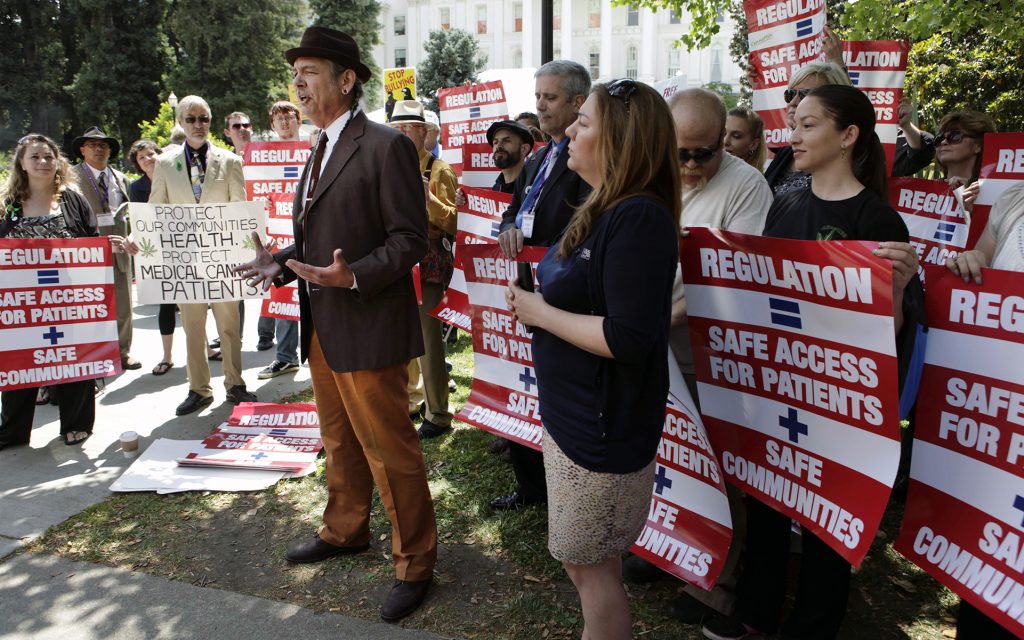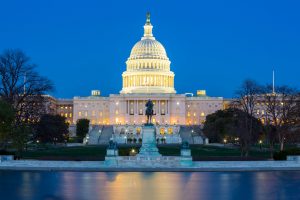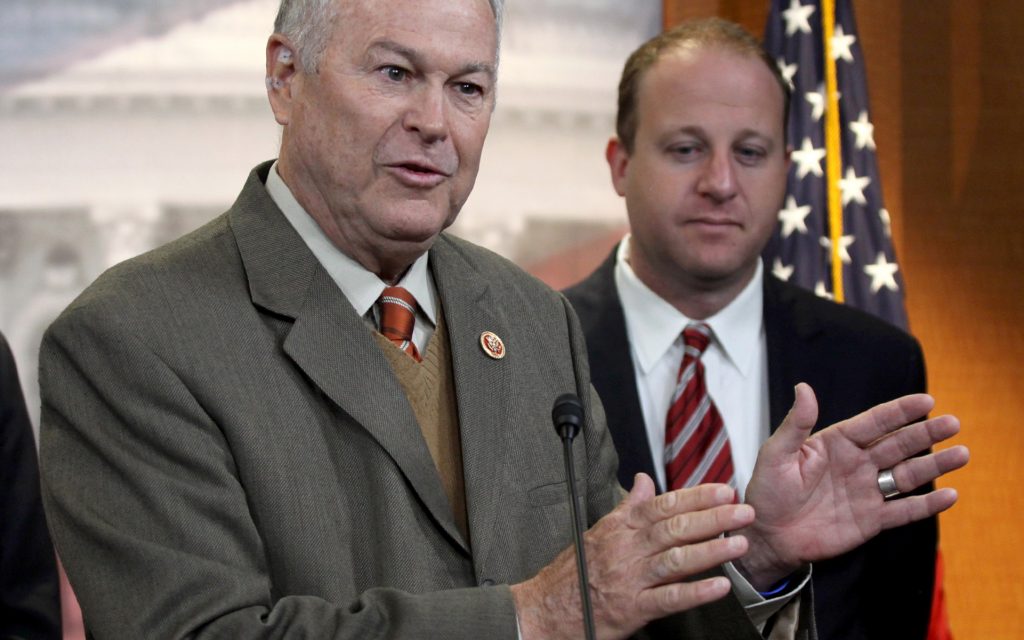Dana Rohrabacher's Last Stand: California Conservative's Fate Could Hinge on Cannabis Vote
On a recent Friday afternoon in Costa Mesa, Calif., Dana Rohrabacher picks up his guitar and begins strumming the chords to his personal anthem.
“This is one I wrote. It’s called ‘Individual Man,’” he says. The simple tune is hardly Dylan-esque. But it is pure Rohrabacher. It is true to the conservative surfer-Congressman, and to the hardline anti-communist who became a freedom-trumpeting hero of the legal cannabis movement.
The spicy aroma of his homemade curry stew wafts in from the kitchen of his modernized 1950s-era California rambler. It’s a typical Friday on a regular weekend return from Washington, D.C. Family, kids, friends and political supporters roll in and out of the house. And Rohrabacher, 70, holds the stage as always.
He tilts back his head and breaks into song, a salute to libertarian living.
I don’t own nobody
Nobody owns me
I’m just an individual man
I just want to be free
Shortly before the performance, he took a phone call from a surfing activist inviting him to support placing small sonar detection buoys to warn of sharks near populated beaches.
The Congressman is suddenly very vulnerable—and the cannabis legalization movement is at risk of losing one of its most powerful defenders.
Rohrabacher’s eyes lit up over the proposal. “I’m going to be back in the water, in about two months, surfing,” said Rohrabacher, who’s recovering from shoulder surgery, the price paid for decades of wave-paddling. “And I don’t want to get eaten by a shark.”
It’s as fitting a metaphor as anything: If there were detection buoys protecting Dana Rohrabacher’s job, they would be sounding the alarm right about now because, politically, sharks are indeed in the water. California’s conservative firebrand and cannabis legalization champion is facing the toughest re-election fight of his life. The Republican stalwart has enjoyed a ballot-proof seat for 30 years. But suddenly he finds himself vulnerable—and the cannabis legalization movement is at risk of losing one of its most powerful defenders.
The Democratic Congressional Campaign Committee has included Rohrabacher’s district (California’s 48th, in the heart of historically conservative Orange County) on its Nov. 2018 target list.
A vast primary election field—
with 15 challengers, including the county Republican chairman—threatens to do the once-unthinkable: oust Dana Rohrabacher.
'Nobody owns me,' he sings. But his relationship with Putin has raised questions.
What’s Causing all the Trouble?
His bid for a 16th term is in peril of wipeout amid a political rip tide of Trump and the Russians. Changing times and district demographics are also taking a toll.
In this traditional Republican stronghold, Donald Trump has always been a liability. Republicans retain an 11 percent voter registration advantage over Democrats here, but district voters chose Hillary Clinton over Trump back in Nov. 2016. Rohrabacher is not only an unabashed Trump supporter. He’s known Vladimir Putin since the early 1990s, took meetings in 2016 and 2017 with high Russian officials, and met privately with WikiLeaks founder Julian Assange last August. Those elements have, in the past year, turned Rohrabacher’s reputation inside-out. Once a macho anti-communist who wielded an AK-47 with forces fighting the Soviets in Afghanistan, he now stands accused of being a Russian toady, a charge he scorns.
Domestic issues aren’t trending smoothly for him, either. Rohrabacher’s caustic comments on immigrants have drawn protests outside his home-district office. Political rivals blast him for not protecting the California shoreline from President Trump’s plans to
reinvigorate off-shore oil drilling.
A recent poll by the Berkeley Institute of Governmental Studies found that 48th district voters, by a 51 percent to 41 percent margin, say they are unlikely to back him in November.
A Friend in Need, Indeed
Amid all the tumult, cannabis advocates—including some notably liberal activists—are coming to Rohrabacher’s aid. The Congressman’s camp reports more than $200,000 in contributions from individuals tied to the industry, which approaches one-fifth of his total donations. (See Table for individual contributors.)
'Without the courage of Dana Rohrabacher, it is possible this industry could have been strangled in its grave.'
Steve DeAngelo, Co-founder, Harborside Health Centers
Jason Beck, owner of the Alternative Herbal Health Services dispensary in West Hollywood, is a key Rohrabacher fundraiser. “There is no stronger ally on Capitol Hill, Republican or Democrat than Dana Rohrabacher,” Beck says.
Beck, who has personally donated $3,900, is bundling tens of thousands in donations from cannabis industry professionals and supporters of legal marijuana. Many of contributions come in amounts of $420, the numeric symbol for cannabis. The Rohrabacher campaign says it is hopes to bring in $420,000, “an appropriate amount for the founder of the cannabis caucus,” says campaign finance director Jason Pitkin.
Notable Cannabis Industry Contributors to the Rohrabacher Campaign
Contributor Company Role Amount
Doug Francis & Rebecca Francis Weedmaps Doug & Rebecca Francis contributed as a private couple. Doug Francis is the CEO of Weedmaps. $10,400
Michael Straumietis Advanced Nutrients CEO $5,400
Keith McCarty Eaze Former CEO $5,400
Braelyn Davis FlavRx Cannabis Marketing Director $5,400
Larry Thacker Caliva CEO $5,400
Michael Nahass Terra Tech COO $4,000
Jason Beck Alternative Herbal Health Services (AHHS) Owner $3,900
Derek Peterson Terra Tech CEO $3,000
David Bronner Dr. Bronner's All-One Cosmic Engagement Officer $2,700
Nick Kovacevish Kush Bottles CEO $2,200
Nitin Khanna Cura Cannabis Solutions CEO $2,700
Andy Williams & Pete Williams Medicine Man Co-founders $1,333
Steve DeAngelo Harborside Health Centers Co-founder $1,000
Jeff Doctor National Indian Cannabis Coalition Executive Director $1,000
19 Years Defending Medical Marijuana
Rep. Dana Rohrabacher, left, accompanied by Rep. Jared Polis (D-CO), speaks during a news conference on Capitol Hill in Washington, Thursday, Nov, 13, 2014, to discuss marijuana laws. (Lauren Victoria Burke/AP)
The cannabis community believes he has earned its support, no matter any other political views.
Back in the late 1990s, when few Republicans or Democrats were standing up for medical cannabis, Rohrabacher took a huge risk and cast a public vote against prohibition on the House floor.
By 1999, Rohrabacher had heard enough patients’ stories to turn his vote. 'It was a benevolent issue: stopping suffering.'
It was the tail end of the Clinton era, when Democrats and Republicans were tripping over themselves to increase prison sentences and undermine California’s medical marijuana law.
In 1999, a Congressional resolution against state-legal medical cannabis forced Rohrabacher to reconsider his position. He’d been a supporter of Nancy Reagan’s ‘Just Say No’ campaign because he thought it valued personal responsibility. But by 1999, he’d heard enough patients’ stories to turn his vote. “It was a benevolent issue: stopping suffering,” he now recalls.
Cannabis legalization, he says, also fit well with his core belief in personal freedom.
Four years later, Rohrabacher reached across the aisle to join with Rep. Maurice Hinchey (D-NY) as co-sponsor of a budget amendment that would prevent the Justice Department from spending any money to prosecute medical cannabis cases in states where it’s legal. It took 11 years for the measure, known later as Rohrabacher-Farr to finally pass in 2014. Though it’s set to expire on March 23, it remains the single most powerful federal protection for cannabis patients in the United States.
“How important is Dana to the cause?” asks Steve DeAngelo, the California cannabis industry leader. “I will tell you without the courage of Dana Rohrabacher, it is possible this industry could have been strangled in its grave. He is absolutely critical.”
Ex-Yippies for Dana
DeAngelo, a former Yippie, holds fiercely progressive views. He disagrees with Rohrabacher on almost every other issue. But because of his cannabis stance, DeAngelo contributed $1,000 to Rohrabacher’s campaign.
Rohrabacher says members of his party warned him early on that he was taking “a great risk” by championing cannabis reform in Congress. Undaunted, last year he went on to help establish the
first ever Congressional Cannabis Caucus.

Steve DeAngelo (in hat) is a longtime liberal activist, but backs Rohrabacher on cannabis. (AP Photo/Steve Yeater)
“I think I may have lost two percentage points (in voter support),” he says of his stance on the issue. “But I think I gained 10 percent.”
He now believes his cannabis leadership, as a rare and strategically important Republican, could trigger a voter surge to help him retain his seat.
“My opponents will call me a hard-right guy,” Rohrabacher tells me. “I am against abortion. And I think global warming is a total fraud. But people could say, ‘Hey, this is the guy who is fighting against the Drug War and is trying to help people rather than put them in jail.”
But Dan Chmielewski, an Orange County public relations executive who writes a political blog,
The Liberal OC, says Rohrabacher’s time is up. “I think Dana’s appeal is looking a lot like the Fox News audience—increasingly older and increasingly whiter and the district is changing demographically,” Chmielewski says. “Orange County is not a one-issue voting community. If he thinks he is going to get liberal votes because of his stance on marijuana, he is sorely mistaken.”
Meanwhile, at Liberty Headquarters
Rohrabacher is plotting his return in campaign offices that reflect his persona.
“Rohrabacher Liberty Headquarters” sit atop Monahan’s Irish Pub in Costa Mesa, just inland from Newport Beach. A “Gone Surfing” sign hangs on the door.
The highlight of the office, which is separate from his official Congressional district headquarters in Huntington Beach, is the Rohrabacher “Liberty Bar.” It comes with two beer taps, a bust of Ronald Reagan and photos of Rohrabacher, in tribal garb, with heavily armed Mujahideen fighters in Afghanistan in 1988. “We have a lot of drinks here after meetings – no doubt,” Rohrabacher says. “This is where people get lubricated.”
Dressed in a tan suit with an open collar that reveals his puka shell necklace, Rohrabacher relaxes in a chair near the bar, without any lubrication. He shares a story about his appearance years back on Bill Maher’s show,
Politically Incorrect, when they poked fun of Bill Clinton’s admission of using cannabis without inhaling.
“He (Maher) leans across the table and says, ‘Hey, Buddy,
did you inhale? I said, ‘Hey, Buddy, I did everything but drink the bong water.”
‘Had I Been Arrested…’
A bust of President Ronald Reagan sits on the bar inside Rep. Dana Rohrabacher’s campaign office. (Nick Agro for Leafly)
Truth be told, Rohrabacher says, he hadn’t touched cannabis for nearly 50 years since he briefly smoked marijuana in his early twenties.
But a little more than a year ago, that changed. It happened after surgeons cut him open, inserting metal rods in both arms and artificial joints in double shoulder replacement surgery. It was the price he paid for grinding down his cartilage during decades of paddling into the surf.
He recently used a CBD topical after his shoulder surgery. 'It allowed the pain to let up, so I could sleep.'
Rep. Dana Rohrabacher
In the painful aftermath of the surgery, Rohrabacher went to a physician in California for his first-ever recommendation for medical marijuana. He later obtained a cannabidiol (CBD) salve at a dispensary in Washington D.C. “I put it on my arms for a couple of hours,” he says. “It allowed the pain to let up, so I could go to sleep.”
He equates his cannabis use, even if far more limited than he once boasted, with his opposition to federal drug policies on marijuana resulting in incarceration and too many life paths disrupted.
“Had I been arrested” as a young man, he says, “I would never have worked for Reagan. I could never have run for office. People would have put up posters saying I was a drug addict. There are societal costs. You can end up ruining your life.”
He is publicly scornful of Sessions, ripping the Republican attorney general for actively working to kill his budget amendment that protects medical cannabis patients and providers.
“Jeff Sessions wants to eliminate Rohrabacher-Farr,” he says. “That just means the drug cartels in Mexico will bring the
mariachis in and say, ‘Let’s celebrate!”
A new version of the amendment (most recently Rohrabacher-Blumenauer, with Oregon Democrat Earl Blumenauer) was kept out of a pending Congressional budget bill by Republican committee chairman Pete Sessions (R-TX). Rohrabacher says he has a promise from House GOP leadership, as well as Democrats and Republican in the Senate he won’t identify, to take up the amendment in eventual conference committee negotiations.
Rohrabacher’s advocacy has earned him the support of liberals and conservatives in the cannabis world. But his political opponents say that support alone won’t save his political career.
A Biotech Challenger
“Smoking pot and surfing are insufficient qualifications for a Congressman,” says Hans Keirstead, a Rohrabacher challenger who recently secured the endorsement of the California Democratic Party. Keirstead, a former University of California, Irvine, professor and a stem cell and cancer researcher, founded a biotech company, California Stem Cell Inc., in 2005. After developing a proprietary method to produce human stem cells, Keirstad
sold the firm for $126 million in 2014.
https://www.caladrius.com/press-rel...greement-to-acquire-california-stem-cell-inc/
Keirstead raised $871,558 for his campaign by the end of 2017, including a $215,000 personal loan, according to Federal Election Commission Reports. He told me he expects to amass $7 million for the race, about one quarter of that from his personal coffers. Born in Canada, Keirstead is running on a platform of addressing climate change, treating health care “as a basic human right,” in contrast to Rohrabacher’s intense opposition to Obamacare. He also advocates a path to citizenship for unauthorized immigrants, and a ban on assault rifles.
Keirstead’s
website stakes out a cautious position: changing marijuana’s status as a Schedule One drug. He also told me he would like to see federal cannabis prohibition repealed—with strict manufacturing regulations to keep toxins out of cannabis extracts.
Keirstead, who says he hasn’t received any industry donations, says this race isn’t remotely about cannabis. He says it’s about a Congressman who has served too long and lost touch with the district. He blasts the Congressman for traveling to controversial meetings with pro-Putin oligarchs and WikiLeaks founder Julian Assange.
“This has nothing to do with America’s interests or the citizens of the 48th District,” Keirstead told me. “Why is he spending time with Russia and dealing with WikiLeaks?”
Democrat: ‘Mad as Hell’
The top-funded Democrat to date, Harley Rouda, a Laguna Beach, technology executive and investor, loaned $675,000 to his own campaign last year, bringing his 2017 total to $1.2 million—$100,000 more than Rohrabacher.
“One year ago, I decided to run for Congress,” Rouda writes on his
website. “I was mad as hell. Donald Trump and Dana Rohrabacher were taking America in the wrong direction.”
He calls for trusting science and acting on climate change (but offers no policy recommendations on cannabis.) Meanwhile, his campaign
videos cast Rohrabacher as a “pompous politician” compromised by Russian connections.
How Supporters See Him
Gary Monahan owns the bar underneath Rohrabacher’s campaign office. ‘I still think this is a safe seat,’ he says. (Nick Agro for Leafly)
Downstairs from the Rohrabacher Liberty Headquarters, Gary Monahan, a former Costa Mesa mayor and 20-year member of the City Council, is the owner and operator of Monahan’s Irish Pub. He’s a longtime Rohrabacher backer, going back to his days as a young volunteer at Rohrabacher’s old campaign office situated behind a Huntington Beach surf shop.
“The first time I was there, we were stuffing envelopes, and somebody comes in and yells, ‘Surf’s up!’ Everybody in the office grabbed their surf boards,” Monahan recalls. “Dana was the first one into the waves. I knew I liked him right then and there.”
Monahan, who calls Rohrabacher “a down-to-earth man with a big heart who works incredibly hard,” welcomes him when Rohrabacher returns to the district most every weekend. He’ll pour him a Smithwick’s Irish Ale and, every now and then, Monahan grins, a Moscow Mule, a cocktail with Vodka, ginger beer and lime.
Monahan, who unsuccessfully tried to pass a local ordinance to license and regulate cannabis dispensaries in Costa Mesa, hails Rohrabacher as a Republican willing to take political risks on the issue. He also says his friend is getting a raw deal on Russia and Trump.
“The press is after Donald Trump and they’re after his friends too,” Monahan says. “I still think this is a safe seat. But Dana is going to have to work very hard. There is going to be a lot of money spent against him.”
At home in Costa Mesa: 'Do you think anybody will vote against me because they think I’m a Russian spy? Give me a break.'
Dana at Home: Keeping it Real
Earlier this month, Rohrabacher invited me to follow him from “Liberty Headquarters” to his house in Costa Mesa. It’s an updated 1950s California ranch-style home in a suburban tract. Here’s another difference between Rohrabacher and some of his leading challengers. They enter the race as tech millionaires. In 2014, Rohrabacher was
listed as the 5th poorest member of Congress.
At home, friends and supporters drift in and out as, in a small kitchen, Rohrabacher makes his signature curry stew and tells stories about the Soviet-Afghan war. Two of his 13-year-old triplets are home. His son, Christian, and daughters, Tristen and Annika, were conceived with assistance of In Vitro Fertilization. That inspired Rohrabacher to become a vocal advocate for stem cell research, a position that caused him “to take a lot of heat from the pro-life movement,” he says.
Rhonda Rohrabacher, his wife of 20 years, is here as well. She’s a longtime Republican activist, and has been running Dana’s campaigns since 2008. (He’s drawn
criticism for putting her on his election payroll.)
Rep. Dana Rohrabacher cooks a coconut curry soup at his home in Costa Mesa, Calif. in early March. (Nick Agro for Leafly)
As he moves to the living room, past still another bust of Ronald Reagan, the candidate known for stern views on illegal immigration (including saying Dreamers who arrived as children don’t deserve a path to citizenship) pours glasses of
Crema de Membrillo, a tequila liqueur. He recounts his love of Mexico and younger days barnstorming to beaches and cantinas in Baja.
He takes a sip of the sweet cocktail and lets it be known that he isn’t about to surrender his seat in Congress, no matter the opposition massing against him. Pointedly, he says, no Russia allegation is going to take him down, that’s for sure.
“I’m not saying I’m not vulnerable,” Rohrabacher tells me. “I think I
am vulnerable. But that’s okay. I’m ahead. I think the voters will see the truth. Do you think anybody will vote against me because they think I’m a Russian spy? Give me a break.”
Um, About That Russia Thing…
Dana Rohrabacher was the son of a Marine Corps pilot, Lt. Col. Donald Tyler Rohrabacher, who instilled in his son the belief that patriotism meant standing up to communism, “the primary threat to the American people.” For years, he did just that, even to the point of facing Soviet artillery fire.
Now he is being assailed for a seemingly warm embrace of a former Soviet KGB agent, Vladimir Putin, in a politically charged time in which U.S. intelligence agencies are saying Russia meddled in the presidential election to help Donald Trump. Supporters of the president, with Rohrabacher among the fiercest, blast Special Prosecutor Robert Mueller’s investigation into alleged Russian collusion with the Trump campaign.

Rohrabacher first met Russian President Vladimir Putin (seen here addressing the Russian parliament in 2003) at a Washington D.C. pub in 1999, when Putin was a young emissary from St. Petersburg. Beer drinking, debate, and arm wrestling ensued. (AP Photo/Misha Japaridze)
His life’s transition from fiery anti-communist to election-meddling denier and accused Putin apologist merits some explaining.
As a young man, Rohrabacher traveled to Vietnam in 1967 to work with anti-communist tribal groups and to Czechoslovakia in 1968 to join with anti-Soviet protesters in Prague. Years later, he went to work as an editorial writer for the Orange County Register, a newspaper that a generation ago offered a fierce blend of anti-communism and libertarianism with a style guide mandating that China be called “Red China” and public schools “tax-supported schools.”
With the election of Ronald Reagan, Rohrabacher scored a dream job as a White House speech writer. Four years later, he left the administration to run for Congress. In November 1988, he was elected to his first term. Three months later, the Soviet Union pulled out of Afghanistan. The Berlin Wall came crashing down that November. “The Cold War was over,” Rohrabacher says, “and Ronald Reagan won.”
In Congress, Reagan’s protégé embraced rapprochement with the former Soviet Union. And in 1992, at Irish Times Pub in Washington D.C., Rohrabacher met an emissary from the Russian city of St. Petersburg—an ex-KGM man named Vladimir Putin. They had a boozy, friendly argument over who prevailed in the Cold War and settled it with an arm-wrestle. Putin won. “We all left laughing,” Rohrabacher says.
Working With Russia Against Terrorism
When Rohrabacher later became chairman of the House Foreign Affairs subcommittee on Europe, Asia and Emerging Threats, he embraced engaging Russia on common interests, particularly fighting international terrorism. Now those efforts, he says, are earning him critical press coverage and some damning headlines.
“
Putin’s Favorite Congressman” reads the title of a recent investigation in Politico. It depicts Rohrabacher as a water-carrier for Russian interests. “
Mueller sets his sights on Kremlin’s favorite congressman” wrote Vanity Fair. That article that described a Feb. 2017 meeting in Washington D.C. between Rohrabacher and Alexander Torskin, deputy director of the Russian Central Bank. The article reported that Torskin sought to establish back door communications between Putin and Trump.
“
He’s a member of Congress. The Kremlin Likes Him So Much It Gave Him a Code Name,” the New York Times recently observed. That piece charged that Rohrabacher flew to Russia in April 2016 to receive accusations against prominent Democratic donors from attorney Natalia V. Veselnitskaya, who’s also accused of offering Donald Trump Jr. political dirt on Hillary Clinton.
Rohrabacher told me he took the meetings while he was acting in an appropriate role as the foreign affairs subcommittee chairman. He blistered the media characterizations, insisting he gathered no dirt on Democrats, did nothing to establish a Putin-Trump back channel nor provide political favors for Russian interests. He has also dismissed criticism over a dinner with indicted former Trump campaign manager Paul Manafort, then an undeclared lobbyist for the Russian-backed government in Ukraine.
“I’ve seen the most vile rhetoric used against me with this phony baloney that I’m Putin’s boy,” he fumed. He insists he is pro-America, not pro-Russia, and blasts critics for pounding the drums to re-ignite the Cold War.
And Also: Julian Assange
But he openly boasts about one meeting. Last August, he traveled to the Ecuadoran embassy in London for a furtive get-together with Julian Assange, a meeting resulted in a
call to testify before the House Select Intelligence committee.
The WikiLeaks founder, Rohrabacher says, assured him the hacked emails did not come from Russia.
Rohrabacher told me he wanted to hear the WikiLeaks founder’s account on the source of all those hacked emails from the Democratic National Committee. U.S. intelligence agencies say Russia hacked the emails to help Donald Trump and damage Hillary Clinton in the presidential election. Rohrabacher told me Assange let him know the emails “didn’t come from the Russians.” He said Assange promised to share his source if Rohrabacher could relay a special request to Donald Trump.
“(Assange said) he wanted free transit and not to be arrested if he left the Ecuadoran Embassy,” Rohrabacher said.
But he says the White House wasn’t willing to receive Rohrabacher’s message, and that he was pointedly rebuffed when he called Chief of Staff John Kelly. With the Mueller investigation on-going, he said, “General Kelly said if you talk to Trump about anything about Russia, they will use that as a wedge to go in with microscope. It’s better not to go down that road.”
Rohrabacher took another road, going on
Fox News’ Sean Hannity’s radio show to announce that his meeting with Assange convinced him that “this unrelenting, sinister story about how Trump colluded with the Russians in order to steal the election is a total con job. A fraud.”
Democratic challenger Hans Keirstead says district voters have heard enough from their Congressman on the subject and are skeptical of his characterizations.
“People are looking at him as being tied up with this Russian mess that investigator Mueller has exposed,” he told me. “And now people are looking at his foolishness on other issues. People are finally watching him speak, and it seems to be rambling nonsense.”
Rohrabacher insists he was sensibly doing his job, one he hopes to continue by winning a 16th term in November.
The Waves Are Rising
Current polls show independent voters trending 61% to 31% against Rohrabacher. But an Orange County pollster says he’s an ‘unusual person’ who usually ‘ends up victorious.’ (Nick Agro for Leafly)
Rohrabacher was re-elected by nearly 17 percentage points in 2016, even as Hillary Clinton won his coastal district over Trump by two points and prevailed in Orange County, the once legendary conservative bastion, by eight points. Rohrabacher has voted in line with Trump’s positions nearly 87 percent of the time,
according to FiveThirtyEight, though he notably voted against fellow Republicans and the president on the recent tax plan. He is now
trailing Trump in the district, with a 38 percent approval rating compared to 47 percent for the president, according to the Berkeley Institute Governmental Studies survey in early February.
The
poll of 1,310 likely voters noted that Rohrabacher gets low marks from a critical sector that accounts for one-fourth of district voter registration: independents. By a 61 to 31 percent, independent (or non-party) voters say they are unlikely to vote for his re-election in California’s June 5 primary, in which the top two vote getters—regardless of party—will advance to a November runoff.
The poll doesn’t measure Rohrabacher against his long list of political challengers. Thus, Justin Wallin, a Newport Beach pollster for Republican candidates and non-partisan races, says Rohrabacher’s high name recognition and reputation as a maverick may carry him through, one more time, in the 48th District. He also said local voters don’t care a whit about Russia.
“That particular district likes to view itself as independent, and that makes Dana uniquely well suited,” Wallin says. “He is unusual, maybe even wacky. He does things where it just seems there will be political consequences and, then, this uniquely unusual person ends up victorious.”
The Congressman and his friends know a surge is swelling against him and, this time, may well take him under. But Howard Hills, an attorney and 30-year surfing buddy, says Rohrabacher has seen it before as a “live and let live surfer,” ever true to his libertarianism even as the breakers crash upon him. And politically, Hills says, “He doesn’t get rattled when the waves are big.”









